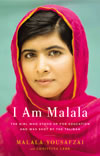Embattled Ideologies: I Am Malala and the Question of Women’s Education in South Asia

Tuesday, November 11, 2014
4:00 pm to 6:00 pm
Sheldon Lubar Faculty Commons
UW Law School | 975 Bascom Mall (7th floor)
University of Wisconsin–Madison
 Beyond the dramatic story of Nobel Peace Prize Laureate Malala Yousafzai’s life and struggle for women’s education as recounted in I Am Malala: The Girl Who Stood Up for Education and Was Shot by the Taliban—UW-Madison’s Go Big Read book selection for 2014—lie profound and complex questions:
Beyond the dramatic story of Nobel Peace Prize Laureate Malala Yousafzai’s life and struggle for women’s education as recounted in I Am Malala: The Girl Who Stood Up for Education and Was Shot by the Taliban—UW-Madison’s Go Big Read book selection for 2014—lie profound and complex questions:
- What are the larger and deeper ideological forces that underpin the political and humanitarian forefront of the “Malala” story? How do we make sense of the perspective of the emancipators even as we want to unravel the fury of the extremists?
- Why are some people staunchly opposed to extremism but also suspicious of the extraordinary limelight that Yousafzai has received? And how have certain claims made in the book offended many Pakistanis, so that they question the extent of Yousafzai's authorship?
- How and why do the politics and ethics of international development aid sometimes backfire? Why are universal concepts such as “womanhood,” “human rights,” or even “education” often problematic?
This symposium brings together scholars whose joint expertise cuts across the challenges of women’s education in tribal Pakistan, the historical encounter of Islam and modernity, and the cultural problematics of international aid. The goal of the program is to highlight how in South Asia and elsewhere debates about educational reform and women’s education in particular do not occur in a vacuum but are highly inflected by historically embedded ideologies, and culturally and politically vexed notions about human identity, education and development.
Watch the recorded video of the symposium.
PRESENTERS
Nancy Kendall is Associate Professor of Educational Policy Studies, University of Wisconsin-Madison, who specializes in ethnographic studies of comparative, international, and global education policy. She is affiliated with the UW African Studies Program, Department of Gender and Women’s Studies, Development Studies Ph.D. Program, and Global Health Institute. Her research has examined children’s sense-making and experiences with gender and education, political democratization, sexuality and HIV/AIDS education, and orphan-focused international programming.
Omar Qureshi is currently the principal of the Islamic Foundation School (Villa Park, Illinois) with considerable experience of teaching at public and private schools in Saudi Arabia and the United States. He has studied the Islamic religious sciences with a number of traditional scholars in Syria and Saudi Arabia and holds specialization in Islamic law and theology. He is also a Ph.D. candidate in Cultural and Educational Policy Studies at Loyola University–Chicago. His dissertation explores the conception of the highest good in Islamic Education.
Sidra Rind is a Ph.D. student in the Department of Educational Policy Studies at the University of Wisconsin–Madison. She received the Virginia Horne Henry Award for her research on female students in the tribal parts of Pakistan. She studies how in the province of Balochistan competing pressures from the state, the separatists, and the Taliban have shaped the educational experience of Pakistani schoolgirls.
MODERATOR
Tayyab Zaidi is a doctoral student in Educational Policy Studies, UW–Madison, working toward a dissertation on models of Islamic education in America. His research interests cut across the educational applications of multimodal and systemic-functional analysis, postcolonial studies, and the impact of Muslim organizations. He is a recipient of the Fulbright Award and the Higher Education Commission Pakistan scholarship. Tayyab holds masters degrees in English as well as Applied Linguistics from the University of Karachi, Pakistan, and in Educational Studies from the University of Michigan, Ann Arbor.
